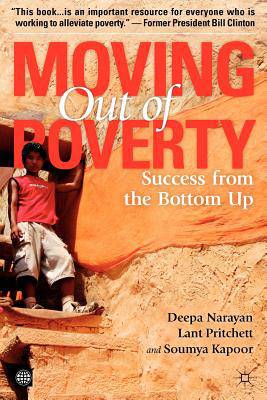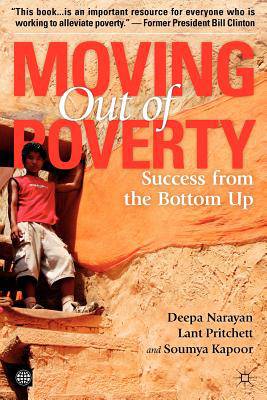
- Afhalen na 1 uur in een winkel met voorraad
- Gratis thuislevering in België vanaf € 30
- Ruim aanbod met 7 miljoen producten
- Afhalen na 1 uur in een winkel met voorraad
- Gratis thuislevering in België vanaf € 30
- Ruim aanbod met 7 miljoen producten
Zoeken
Moving Out of Poverty
Success from the Bottom Up Volume 2
Palgrave MacMillan Uk, Deepa Narayan, Lant Pritchett, Soumya Kapoor
€ 61,45
+ 122 punten
Uitvoering
Omschrijving
'No matter if I fall, I get up again. If I fall 5,000 times, I will stand up another 5,000 times.' -- William, a 37-year-old from El Gorrión, Colombia Why and how do some people move out of poverty--and stay out--while others remain trapped? Most books on growth and poverty reduction are dominated by the perspectives of policy makers and academic experts. In contrast, 'Moving Out of Poverty: Success from the Bottom Up' presents the experiences of poor people who have made it out of poverty. The book's findings draw from the Moving Out of Poverty research conducted in communities in 15 countries in Africa, East Asia, Latin America, and South Asia. The authors synthesize the results of qualitative and quantitative research based on discussions with over 60,000 people in rural areas. They offer bottom-up perspectives on the processes and local institutions that play key roles in escapes from poverty. The study finds that there are no differences in the initiatives taken by the poor, the rich, and the upwardly mobile. What, then, explains the difference in outcomes? The authors demonstrate how--in the face of deep social inequalities that block access to economic opportunities and local democracies--individual initiative and empowerment by themselves are often not enough to escape poverty. This book will be of interest to all concerned with equity in an increasingly unequal world.
Specificaties
Betrokkenen
- Auteur(s):
- Uitgeverij:
Inhoud
- Aantal bladzijden:
- 456
- Taal:
- Engels
- Reeks:
- Reeksnummer:
- nr. 2
Eigenschappen
- Productcode (EAN):
- 9780821372159
- Verschijningsdatum:
- 1/12/2008
- Uitvoering:
- Paperback
- Formaat:
- Trade paperback (VS)
- Afmetingen:
- 152 mm x 226 mm
- Gewicht:
- 589 g

Alleen bij Standaard Boekhandel
+ 122 punten op je klantenkaart van Standaard Boekhandel
Beoordelingen
We publiceren alleen reviews die voldoen aan de voorwaarden voor reviews. Bekijk onze voorwaarden voor reviews.







